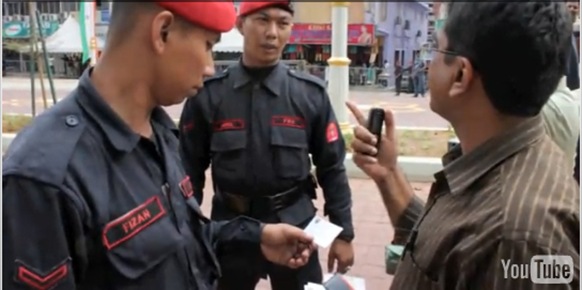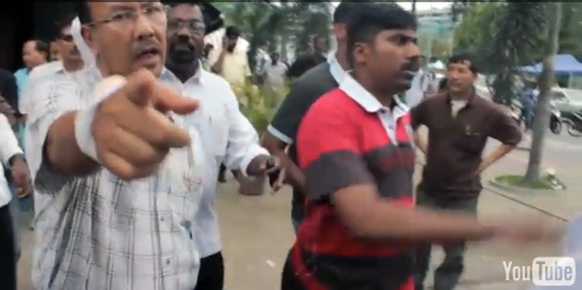Around 200 Malaysians gathered Wednesday to protest Indian Prime Minister Manmohan Singh inaugurating ‘Little India’ in Brickfields, Malaysia, were dispersed when police arrested key leaders, Free Malaysia Today reported Thursday. The protestors questioned the rationale of naming the area ‘Little India’ when most traders doing business there for the past three centuries were Tamils. The protestors were also unhappy about Malaysian government choosing Manmohan Singh to preside over the launch. Manmohan Singh was least concerned about Tamil welfare, “Look at what happened in Sri Lanka. The Tamils were massacred by the Sri Lankan army but he was very quiet about it. The Sri Lankan army also attacked Tamil fishermen in Rameswaram (India) but Manmohan was mum about it as well,” M S Arjunan, a Malaysian Tamil leader said.
 Due to geographical disposition and feasibility of maritime routes, the reciprocal relationship between the ancient Tamil country and Malaysia was prehistoric and it was one of the earliest interactions between the two regions: South Asia and maritime Southeast Asia.
Due to geographical disposition and feasibility of maritime routes, the reciprocal relationship between the ancient Tamil country and Malaysia was prehistoric and it was one of the earliest interactions between the two regions: South Asia and maritime Southeast Asia.
The Naakas, who were a part of the ancient Tamil identity, are considered to be Austronesians who freely interacted between South and Southeast Asia in the prehistoric past. The introduction of many of the crops we have today is attributed to such early interactions.
One of the earliest states that arose in Malay Peninsula at the Isthmus of Kra, before the dawn of the Common Era, was Kaazhakam or Kadaaram (the present Kedah in Malaysia), known in Changkam Tamil literature as a country from where commercial items were coming. The country got its name from Tamil / Dravidian Kaazh-akam that meant ‘the country of coconut’. (Kaazh: nut, coconut; Akam: place, locality)
Malacca, the last kingdom of Malaysia before the advent of colonialism, was founded by Paramesvara (later,Iskandar Shah), who is considered to be a Tamil prince went from Naakap-paddinam in Tamil Nadu.
The very words of identity, Malaya for the country (mountainous country) and Malay for the ethnicity and language, have come from the Tamil / Dravidian word Malai, meaning mountain or hill.
All recognise that literacy of Southeast Asia as far as the Philippines was due to Brahmi-based alphabets. But only a few, familiar with the technicality of the script, know that what went to Southeast Asia was the kind of Brahmi-based script developed in the Tamil country.
Ancient Tamils had their independent relationship with China through the Isthmus of Kra and the Straits of Malacca, passing through today’s Malaysia, Thailand, Singapore and Indonesia.
While committing and abetting genocide against Tamils on one hand, the Establishment in New Delhi riding on the hard-earned heritage of Tamils on the other hand when it comes to ‘Indian’ geopolitical and commercial interests, has angered Tamils in Malaysia.
 “If Manmohan was really concerned about the Tamil community in Malaysia, he should visit those in rural areas,” Arjunan told FMT when quizzed on the objective of his protest.
“If Manmohan was really concerned about the Tamil community in Malaysia, he should visit those in rural areas,” Arjunan told FMT when quizzed on the objective of his protest.
“About 90% of the shops in Brickfields are owned by Chinese and the Indian traders are just renting the premises. If the shop owners chase them away, what will happen to the traders?” Arjunan asked about the fanfare of Indian and Malaysian PMs launching ‘Little India’ shopping area.
“The Tamils have been doing business there for the past three centuries, therefore it is better to name it ‘Bandar Tamil’ (Tamil City),” he said.
“It is a Malaysian event. Naturally a local leader should have officiated the event. Either Prime Minister Najib Tun Razak or even MIC president S Samy Vellu could have done it,” Arjunan further said, expressing his opposition to the inauguration by the Indian Prime Minister.
Riding on Tamil heritage while abetting Tamil genocide is also a trend noticed in the Establishments of Malaysia and Singapore, Tamil circles in Malaysia and Singapore said. They cited at the recent enthusiasm being shown by the said Establishments in using the Eezham Tamils of these countries as a ploy to enter into the ‘development’ game in the island of Sri Lanka, while not recognising the due political status of the nation of Eezham Tamils in the island.
They also cited at Malaysian Tamil tourists being lured to visit ‘Ramayana sites’ in the island of Sri Lanka.
Meanwhile, any attempt by Tamils to culturally and politically assert to their due identity and position in the contemporary world, is consciously detracted by a class of New Delhi academics having ‘Stalinist’ outlook of Indian imperialism, academics in Tamil Nadu pointed out.
These ‘sane, sensible and saintly intellectuals’ of New Delhi close their eyes to genocide when it happens to Tamils but come forward with ‘universalism’ when it suits Indian imperialism, the academics said, adding that the Stalinist outlook is deemed to collapse just as Soviet Union collapsed.
There is a conscious intellectual detraction and religio-elite coordination based on Brahmanism and Buddhism, emanating from the centres of New Delhi, Chennai and Colombo to squeeze Tamil aspirations, academics in Tamil Nadu said.
On the New Delhi school of academic thinking, they cited what Prof S D Muni wrote in The Hindu in August, on a university project in Bihar that India is thinking in the dimensions of Oxford and Cambridge universities to parade its new imperial status. There are many Asian partners, mainly Singapore, in this education business, now named Nalanda University.
“Nalanda University is destined to emerge as a strong instrument of soft power at two levels; for the rising Asia in relation to the West and for India in relation to Asia,” Muni who long handled South Asian Studies at Jawaharlal Nehru University in New Delhi, and now serving the Institute of South Asian Studies in Singapore, said.
“India has, till recently, been rather casual about and indifferent to it strength in the use of soft power in its foreign policy and diplomacy. The goodwill and admiration clustered around India’s cultural footprints in Asia ranging from Angkor Wat to Garuda and Ganesha; from the Ramayana and the Mahabharata to the roots of South East Asian languages in Sanskrit and Pali, from the dance forms of Bharatanatyam and Kathak to the traditional systems of Yoga and Ayurveda, have not been harnessed systematically,” Prof. Muni, who is a Bihari, said.
Prof. Muni was awarded ‘Sri Lanka Ratna’ along with N. Ram of The Hindu by Colombo in 2005, for the ‘services’ rendered by them to the Sri Lankan state.
In contrast to what Muni wants to market, the Tamil Nadu academics pointed out what another Delhi academic Kesavan Veluthat wrote in the Frontline last week, reviewing a book Early Historic Tamil Nadu, edited by Prof. K. Indrapala to commemorate the 25th anniversary of the demise of Prof. K. Kailasapathy.
Using the name of Kailasapathy, the thrust of the review was against considering Changkam Tamil literature as classical and was against considering the position of Tamil as a classical language along with Sanskrit, Latin, Greek, etc. In a nuanced way the review discredited writers on the antiquity of Tamil literacy as their evidences were not compelling, but promoted the writings of Delhi-school contributors of ‘all India elite vision’ as competent, Tamil Nadu academics said.
The response of Tamils whether in India, in the island or Sri Lanka or elsewhere in the diaspora, stems from political injustice meted out to them, now on a global scale.
The New Delhi Establishment being selective in injustice to Eezham Tamils, its phobia against Tamil identity and its tendency to set some competitive identities against Tamils will boomerang, as Tamils would start considering the Indian identity itself as a taboo, just as how they feel about ‘Sri Lankan’ identity today. India will face a deeply divided and hostile Indian diaspora if it doesn’t come out with justice to Eezham Tamils and neither the New Delhi school of intellectual imperialists nor the Chennai-based media could do anything about it, commented Indian Tamil diaspora circles.
Eezham Tamils were at the receiving end of China because of India. The West’s inability to do anything was also because of India. But, India didn’t care. A main reason for the global plight of Tamils is that they have not devised a concerted foreign policy or international policy to do justice to their geopolitical strength, despite having a worldwide diaspora, and they don’t have an appropriate leadership in Tamil Nadu going beyond rhetoric, was the comment of an Eezham Tamil political activist in the diaspora.
(For updates you can share with your friends, follow TNN on Facebook and Twitter )
